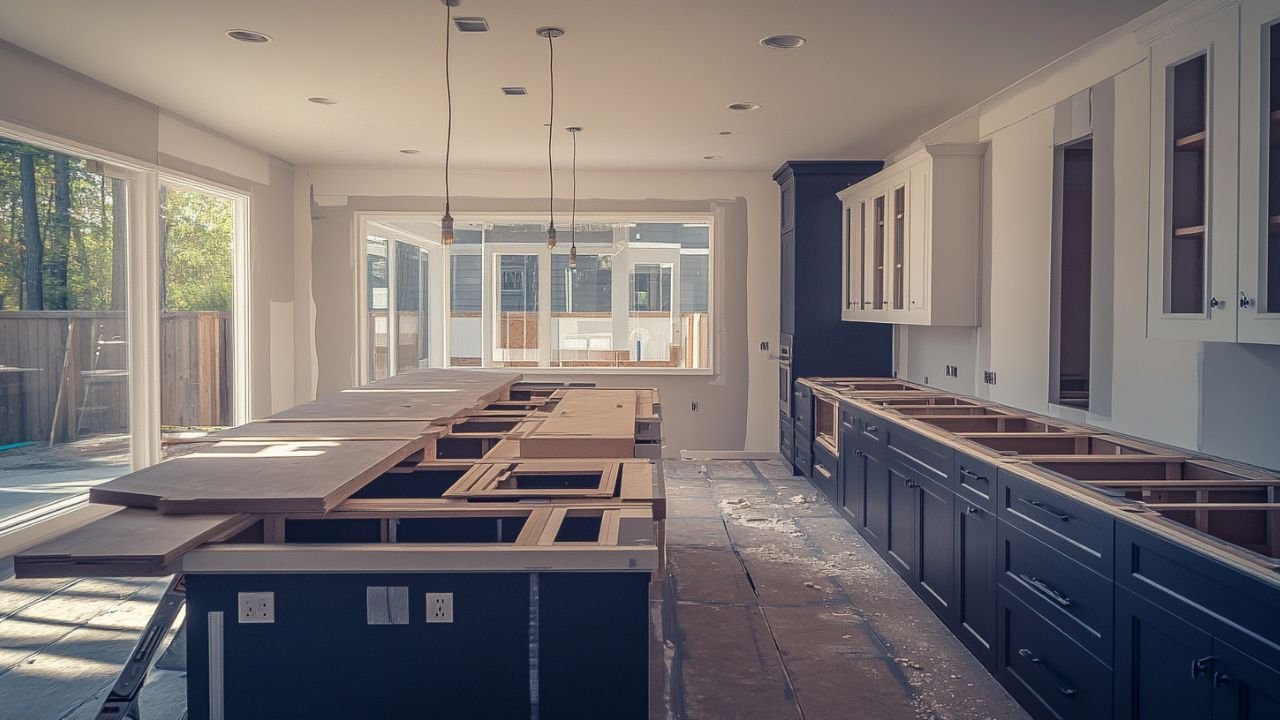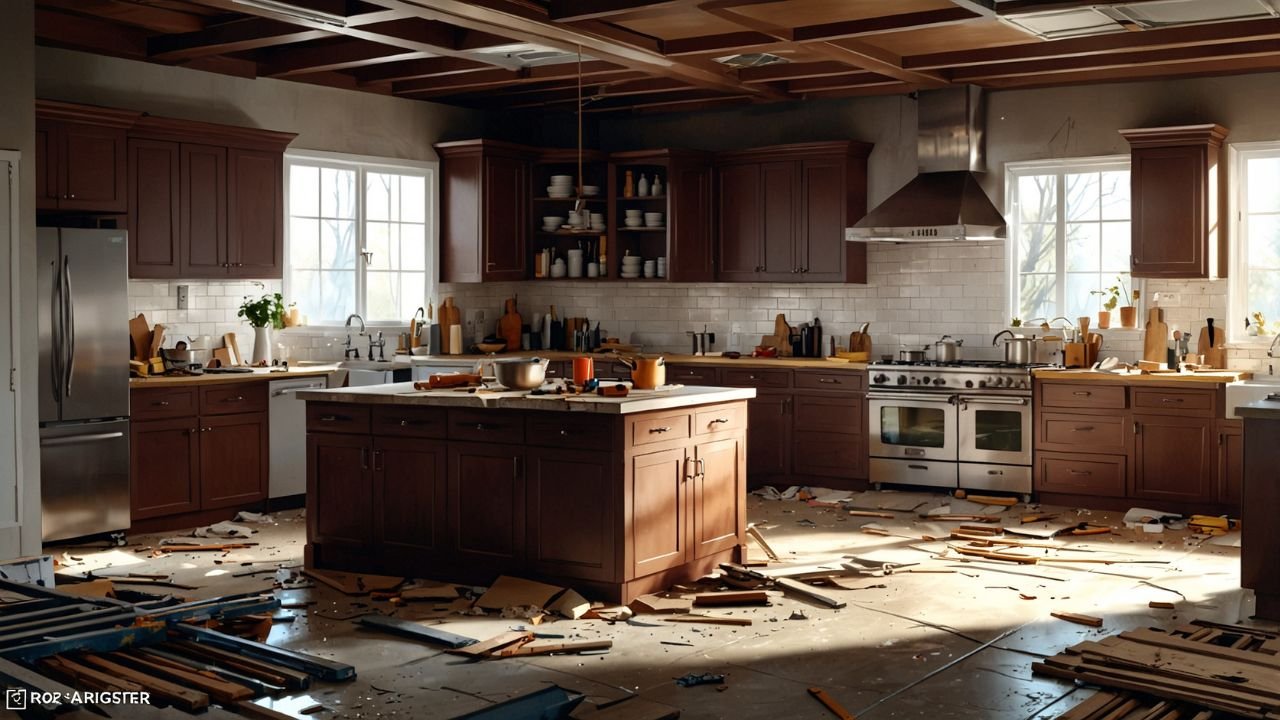How Long Does It Take to Remodel a Kitchen?
It starts with excitement: you’re finally ready to update that outdated kitchen. But then comes the question no one wants to ask out loud: How long is this going to take?
Because living without a functioning kitchen, eating takeout for weeks, and navigating contractors in your space can wear thin fast. Time isn’t just money. It’s sanity.
Here, we’ll talk about what really goes into a kitchen remodel timeline, what slows it down, and how to plan smarter from day one.
So How Long Does a Kitchen Remodel Typically Take?
Most kitchen remodels take 6 to 12 weeks once construction begins. That timeline covers everything from demolition to final finishes. Smaller, surface-level updates can wrap up in as little as four weeks. Meanwhile, full kitchen renovations, especially those involving layout changes, permits, or custom materials, can take several months.
The timeline for a kitchen remodel also depends on how well the project is planned upfront. Delays often happen not because of the work itself, but because of late material orders, surprise repairs, or poor communication between teams.
Want a better idea of how each phase unfolds and how to keep things moving smoothly? Keep reading.
The Phases of a Kitchen Remodel: What to Expect and When
Six to twelve weeks sounds like a long stretch when your stove’s unplugged and there’s a contractor in your driveway. But a kitchen remodel project isn’t one big job. It’s a series of steps, and knowing what happens when can ease a lot of the stress.
Here’s how the kitchen renovation process typically plays out, from design to the final wipe-down.
Planning and design (2 to 6 weeks)
This is the part where everything starts taking shape (literally). You’ll work with a kitchen designer or contractor to map out your layout, choose finishes, and figure out what’s possible based on your budget and space.
In Portland, this stage can take longer if you're going for something highly customized or need to coordinate with a historic home’s original footprint. But the more detailed the planning, the fewer headaches later on.
Permits and approvals (1 to 4 weeks)
Depending on the scope of your remodel, you may need permits for plumbing, electrical, or structural changes. Some Portland projects move through the permit office quickly. Others? Not so much.
We always recommend building this time into your schedule upfront. Because you don’t want to be stuck in limbo waiting for city green lights once demo’s done.
Ordering materials (2 to 8 weeks)
New cabinets, countertops, tile, lighting. All those beautiful details take time to arrive, especially if they’re custom or backordered. Local suppliers around Portland have good options, but if you’re ordering out of state or choosing something specialty, expect longer lead times.
PRO TIP: Approve materials as early as possible. Delays often happen here and they’re completely avoidable with good planning.
Demolition and prep (2 to 5 days)
This is the “tear it all out” stage. Cabinets come down, flooring comes up, and the old kitchen becomes a blank slate. It’s fast and loud but it sets the tone for what’s ahead.
Depending on what we find under the surface (old plumbing, questionable wiring), this phase may reveal surprises. That’s why preparation and contingency planning are key.
Structural and rough-in work (1 to 2 weeks)
Framing changes. Electrical and plumbing reroutes. HVAC adjustments. This is where your new kitchen starts taking shape behind the walls. It’s not the most glamorous part, but it’s one of the most important.
In older Portland homes, we often uncover quirky building methods that require a bit more finesse, but we’ve seen it all.
Inspections (varies)
If you choose to renovate and it includes structural, plumbing, or electrical updates, expect at least one or two city inspections. These help ensure everything is safe, up to code, and ready for the next phase.
Timelines can vary depending on how backed up the inspection calendar is. We always factor these pauses into your schedule so there are no surprises.
Installation and finishing (3 to 6 weeks)
This is where the magic happens. Cabinets are installed. Flooring goes down. Countertops are templated and set. Backsplash tile is laid. Paint goes up. Appliances are hooked in. It finally starts to look like a kitchen again.
Some parts of this stage can happen in parallel. Others need to be sequenced carefully. A professional remodeling team knows how to keep things moving without rushing the details.
What factors can speed up (or delay) your remodel?
Two homes. Same square footage. Same start date. One finishes in six weeks, the other drags past three months. What gives?
A kitchen remodel’s timeline is shaped by decisions, prep work, and the team behind it. Below we’ll tackle what makes the difference between smooth sailing and constant hold-ups.
Scope of the project
This is the biggest variable. Are you doing a light refresh, new counters, maybe some paint? Or are you gutting the kitchen, knocking out walls, rerouting plumbing, and building something brand new?
The more you change, the longer it takes. Full-gut remodels and reconfiguring the kitchen layout naturally need more time than minor updates.
Custom vs. stock materials
Want custom cabinets built to fit that quirky corner? Expect a longer wait. Stock options from big-box stores can arrive quickly, but they may not fit your style or space as well.
The more personalized your choices (think handmade tile or imported fixtures), the more time you’ll need to get everything in hand and installed properly.
Permitting and inspection timelines
Permits can be quick... or they can test your patience. It depends on your location, scope of work, and how your local office handles residential projects. Add in inspections between phases, and delays can sneak in fast if you don’t plan around them.
A general contractor who knows the system and builds this into the schedule can save you serious time and headaches.
Contractor coordination and communication
Even the best kitchen design won’t stay on schedule if crews aren’t aligned. Timely communication between plumbers, electricians, tile setters, and painters is everything.
When your project manager has a tight grip on the schedule, the work flows. When they don’t, you get awkward gaps, missed handoffs, and frustrating delays. That’s why who you hire matters.
Can you live at home during the remodel?
The short answer: yes, but it takes some patience as well as a game plan. Whether or not you should stay put depends on your tolerance for dust, noise, and temporarily not having a working kitchen.
If you’re thinking about toughing it out, here’s what you need to consider.
Pros and cons of staying put
The pros:
You save money on short-term housing or storage
You stay close to the job site
You can keep an eye on the progress.
The cons:
You’ll be living in a construction zone. That means:
noise early in the morning
workers coming and going
limited access to essentials like your stove, sink, and fridge.
If you have pets, kids, or work from home, it can get tricky fast. It’s doable but not exactly relaxing.
Tips for surviving a kitchen remodel
Set up a temporary kitchen station. Somewhere with a microwave, coffee maker, toaster oven, and mini fridge. Clear a spot in the garage, laundry room, or even a corner of the living room. Stock up on disposable plates and utensils to avoid doing dishes in the bathtub.
Batch cook meals before demo day, plan for more takeout nights, and embrace the grill if weather allows. Keep the space safe, especially if you have kids or pets, and communicate with your contractor about daily work hours and site cleanup.
Being prepared won’t make it fun, but it’ll make it manageable.
What Homeowners Should Know About Kitchen Renovation Timeline
Every remodel is different, but some patterns hold true. Especially if you’ve never been through one before. A realistic timeline isn’t only about when things start, but also how the whole process fits together.
What most homeowners don’t realize until they’re in the middle of it are the following.
Permit timelines can throw things off
Even if your contractor submits permit applications right away, approval isn’t always instant. Some areas process simple requests in days. Others can take weeks, most notably for anything structural, electrical, or plumbing-related.
It’s a real chunk of your schedule. That’s why getting permits sorted early in the process is key to staying on track.
Material delays are still a thing
Yes, supply chain issues have eased up, but not completely. Certain products, like custom cabinetry, specialty hardware, or high-demand tile styles, still come with unpredictable lead times.
The best way around it? Choose materials early, get orders in fast, and have backups ready just in case something’s backordered at the last minute.
Contractor scheduling matters more than you think
Even if your existing kitchen is ready for tile on Tuesday, your tile pro might be booked till Friday. Coordinating subcontractors is like lining up dominoes… one delay can throw the whole sequence off.
A good remodeling company builds cushion into the schedule, confirms availability ahead of time, and doesn’t overbook themselves across too many projects at once.
Revive Works keeps the timeline real
We’ve seen what happens when expectations don’t match reality, and we don’t play that game.
At Revive Works, we build realistic timelines based on your exact kitchen and scope of work. We stay in touch, flag delays early, and keep you in the loop from start to finish.
A solid plan beats crossed fingers, every time.
Final Thoughts
A typical kitchen renovation doesn’t happen overnight. But with the right crew and a clear plan, it doesn’t have to drag on forever either. Knowing what to expect at each stage helps you stay prepared, calm, and confident from demo to the final detail.
Want a timeline tailored to your home renovation goals?
Reach out to Revive Works Remodeling and let’s map it out.




